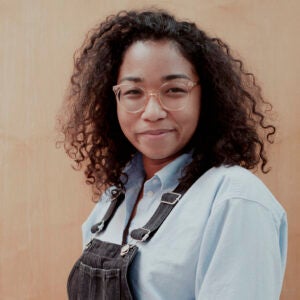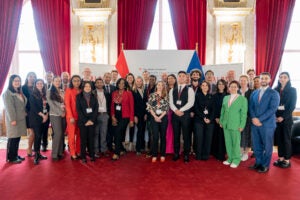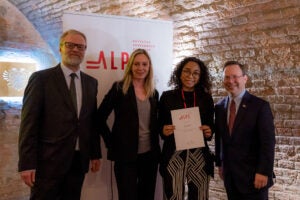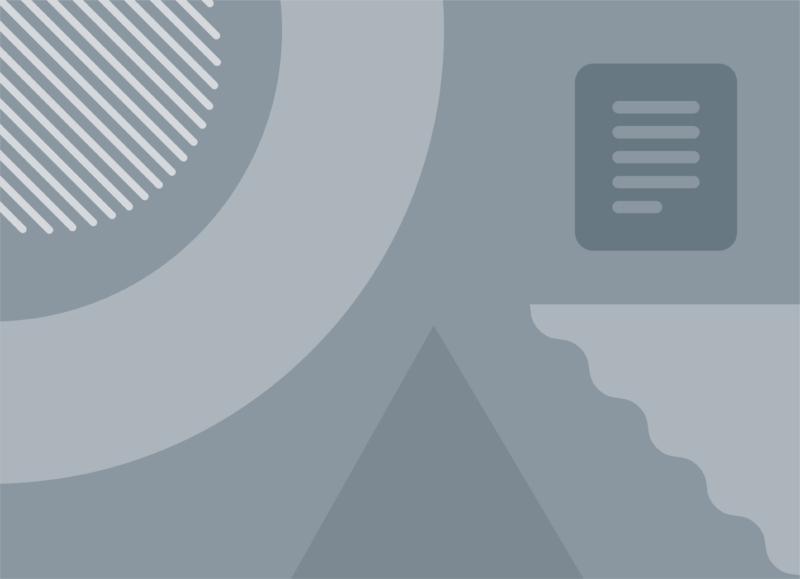
June 1, 2023
When the prestigious invite to the Austrian Leadership Programs from the Austrian Embassy rolled into her inbox, Dr. Patricia (Patty) Grace thought it could have been spam. Within thirty minutes, Dr. Sarah Fortune, Immunology and Infectious Diseases Department Chair (and Patty’s mentor), informed her the opportunity was very much real.
The invite-only Austrian Leadership Programs connect trailblazers from all over the world for one week in Austria—also known as ALPS.
“They reached out and told me that the focus was on life sciences and digital tech, and obviously as a scientist that’s intriguing, and knowing nothing about Austrian science, I was excited and flattered,” Patty said.
A postdoctoral fellow in the Department of Immunology and Infectious Diseases in the Sarah Fortune Lab as well as the Galit Alter at the Ragon Institute, Patty examines the behavior of antibodies in natural TB infection—if human antibodies from different TB disease states can confer control of Mtb growth or protection in a mouse model of Mtb infection.

In cool, sunny Austria, Patty and the other 24 leaders in the program could organize their days from 8 a.m. to 8 p.m., the schedule crammed with events coordinated by the Department for Business Service at the Austrian Ministry for Foreign Affairs, such as seminars and meetings with various companies and academic institutions involved in science. The invitees, who gathered from over 20 countries, hopped around Austria—which Patty had never been to before—and met people from the US-Embassy, getting a glimpse of Austrian life, business, and value in science.
“It felt like an adult foreign exchange program,” Patty said.
Next: the opportunity to dig into bio sciences, her passion and expertise. “What my time looked like was that I was able to meet one-on-one with a specific company that is developing antibody therapies for tuberculosis,” Patty explained, “which, if you were to Google me, those are the words that you would see associated with my name. So that was really cool that they had me in mind when they were planning the schedule.”
As her fellow invitees attended individual meetings of their own, Patty also spent time with an Austrian vaccine company that had produced several FDA-approved vaccines, examining potential future partnership opportunities.
The ALPS itinerary explored the intersection of digital tech with physics and science. The group toured a company creating hearing implants for adults and children alike, and while scrutinizing the Swarovski Museum, they experienced the history of the merge between science and crystal-making (along with entering a twinkling world of beauty).

The experience was twofold for Patty: The science and business portions of ALPs were invigorating, but so were the people. Embassy. Associated leaders. Government. “I had the opportunity to hear about how people were influencing science, policy, and science education in their countries,” she stated.
She expanded her own network of scientists too by connecting with various assistant professors and associate professors of science.
“And there was a really large representation of women amongst the scientists who were invited. So that was also eye-opening for me to hear the stories of women, scientists, and different countries and rally around this idea of STEM for women,” Patty said.
She intends to continue building these relationships with the people she met at ALPS and the companies involved with therapeutics—especially for TB—in addition to exploring the “ALPS network,” a wide-reaching community where she may link up with even more professionals with overlapping interests.
Her new acquaintances motivated Patty to consider how she can promote STEM and education in joint efforts with others worldwide.
And of course, the cohort visited the Alps themselves—the kind with snowy peaks and cows and grass. A 6-hour bus ride from Vienna delivered the group to the town of Innsbruck, where they stayed for a couple nights and traveled into the mountains. Patty received an up-close view of the scenery and science and business in Innsbruck. “Hearing about daily life in the Alps and how different regions of Austria influence people’s living was a nice added layer on top of talking about science all day that was unexpected but really an amazing experience with respect to travel,” she said.
She holds much gratitude for the ALPS organizing team, the backbone of the program. Their endeavors have allowed ALPS to focus on various topics and convene decision-makers from across the globe, aside from Europe, for years.
Patty is bringing global connections, enhanced scientific knowledge, and new ideas back to Boston from her educational and unanticipated journey to the ALPS.




